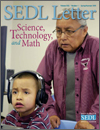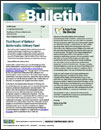SEDL's Free Magazines/Newsletters for Technology in the Classroom
Technology in the Classroom
Magazines/Newsletters
SEDL Letter Volume XXII, Number 1: Science, Technology, and Math (2010)
In this issue of SEDL Letter, we address challenges and solutions related to science, technology, engineering, and Math (STEM) instruction. We describe three different professional development projects, where SEDL content experts are helping teachers provide instruction in math, science, and technology—or some combination of the three—more effectively and in a more integrated way. We examine the importance of evaluation in helping educators identify and meet goals on STEM-related projects. We also review a research report on ways that instructors can engage students, especially those who are underrepresented in STEM fields.
In this issue of SEDL Letter, we address challenges and solutions related to science, technology, engineering, and Math (STEM) instruction. We describe three different professional development projects, where SEDL content experts are helping teachers provide instruction in math, science, and technology—or some combination of the three—more effectively and in a more integrated way. We examine the importance of evaluation in helping educators identify and meet goals on STEM-related projects. We also review a research report on ways that instructors can engage students, especially those who are underrepresented in STEM fields.
Southeast Comprehensive Center eBulletin, Volume 3, Number 3: Final Report of National Mathematics Advisory Panel (2009)
Student effort matters! This is just one of the findings of the National Mathematics Advisory Panel in its 2008 report titled Foundations for Success—The Final Report of the National Mathematics Advisory Panel. This 120-page report addresses one central question: How can schools in the United States improve mathematics curriculum, instruction, assessment, teacher training and support so that all American students learn mathematics so that they can compete with students from other nations? In the report, the advisory panel discusses 45 findings and recommendations on key topics, such as instructional practices, materials, professional development, and assessments. The authors stress the importance of knowledgeable teachers, effective instruction, effective assessment, and the need for rigorous research in mathematics education.
Student effort matters! This is just one of the findings of the National Mathematics Advisory Panel in its 2008 report titled Foundations for Success—The Final Report of the National Mathematics Advisory Panel. This 120-page report addresses one central question: How can schools in the United States improve mathematics curriculum, instruction, assessment, teacher training and support so that all American students learn mathematics so that they can compete with students from other nations? In the report, the advisory panel discusses 45 findings and recommendations on key topics, such as instructional practices, materials, professional development, and assessments. The authors stress the importance of knowledgeable teachers, effective instruction, effective assessment, and the need for rigorous research in mathematics education.


